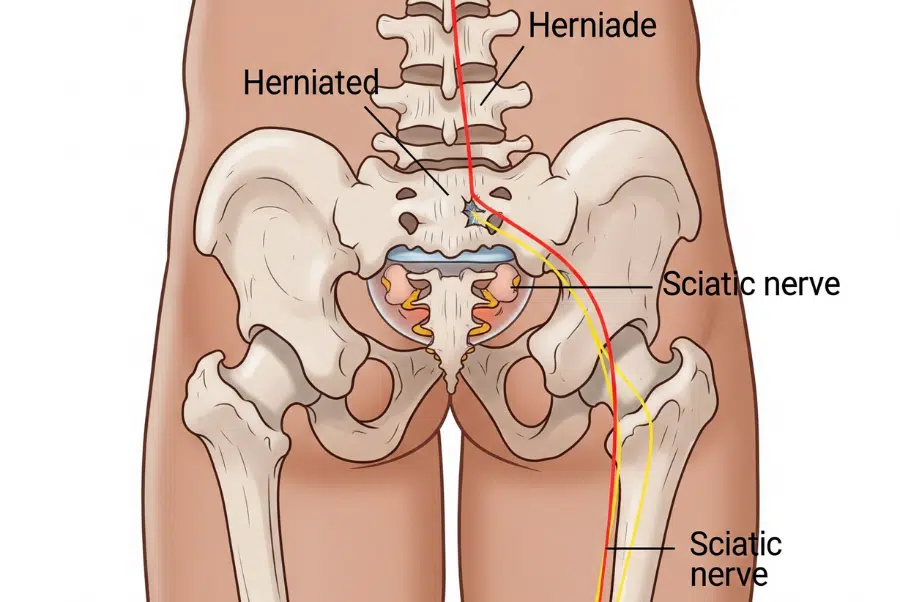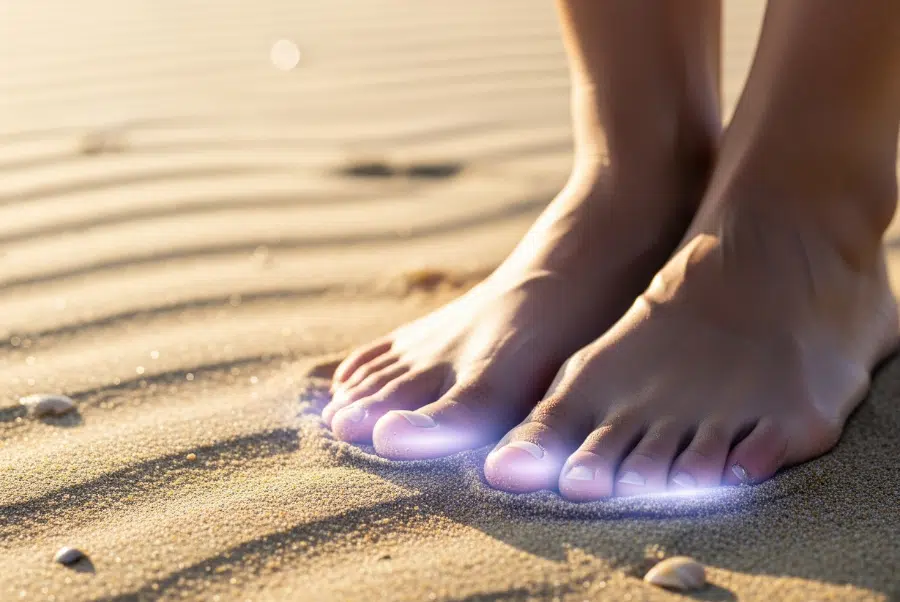Nerve pain due to herniated disc can strike when you least expect it. Ever been at Yorktown Beach trying to relax, and suddenly your leg lights up with burning pain? Or maybe you’re standing in line at Food Lion on George Washington Memorial Hwy and your foot goes numb for no reason.
That’s what happens when a herniated disc presses on your nerves. It’s not just a “back issue” — it can mess with how you sit, stand, walk, or even sleep. If you’re in Yorktown VA and you’ve been brushing off nerve pain, it’s time to pay attention.
Today, we’re breaking down 6 shocking ways herniated discs cause nerve pain — and what you can do about it before it gets worse.
Why This Matters for Yorktown Residents
Imagine trying to enjoy Yorktown Market Days with your family, but halfway through the stroll your leg feels like it’s on fire. Or picture sitting at a York Falcons football game and your back seizes up before halftime.
This is real life for a lot of locals. Herniated discs don’t just cause back aches. They press on nerves that control your arms, legs, and even how your muscles fire. That’s why nerve pain from disc problems feels sharp, weird, or downright scary.
The good news? When you understand how discs trigger nerve pain, you can make better choices about treatment — and maybe avoid surgery altogether.
1. Sciatica – The Classic “Lightning Bolt” Pain

This is the #1 nerve issue most people think of when they hear “herniated disc.” When a disc in your lower back bulges or slips, it often presses directly on the sciatic nerve — the body’s longest nerve, stretching from your lower spine all the way down to your feet.
The result? A pain that feels like a lightning strike. Some describe it as sharp, burning, or buzzing. Others say it’s like their leg is “half-asleep but on fire at the same time.” It usually travels down one leg — not both — and can make sitting at your desk near Victory Blvd, driving across the James River Bridge, or even standing in line at Food Lion feel unbearable.
What makes sciatica tricky is that it doesn’t stay put. The pain can shoot, throb, or even switch between numbness and stabbing jolts. Some people also notice weakness in their leg or foot — making it harder to climb stairs, walk long distances, or even trust their balance.
Here’s the takeaway: if you’re dealing with sciatica, it’s not just a “pulled muscle” or something you should wait out with ibuprofen. It usually means the disc is pressing harder on your nerves than your body can handle. The longer it’s left untreated, the more likely it can interfere with daily life — and the harder it becomes to fix.
2. Numbness and Tingling in Your Feet or Hands

Here’s the scary truth: herniated discs don’t always show up as pain. Sometimes, the bigger warning sign is numbness or tingling. When a disc presses on or chokes off nerve pathways, the signals your brain normally sends just… don’t get through. The result? Parts of your body start to feel “dead,” weak, or like they’ve fallen asleep — except the feeling doesn’t go away.
In Yorktown, we’ve seen folks working long shifts at the shipyard, standing on concrete all day at Walmart, or even typing at a desk near Kiln Creek suddenly realize they can’t feel their toes, fingers, or even a patch of skin on their leg. Many brush it off as “bad circulation” or “just getting older,” but let’s be real — it’s often a red flag that a nerve is being seriously compressed.
The real danger? Nerves don’t heal well if they stay pinched too long. What starts as occasional tingling can progress into full numbness or weakness — and at that point, your body is telling you it’s losing communication with that limb. That can affect balance, grip strength, or even simple things like walking across Yorktown Beach or carrying groceries up the stairs.
Tip: If tingling or numbness sticks around for more than a few days, don’t ignore it. This isn’t just “annoying” — it’s your body warning you that something deeper needs attention. The earlier it’s treated, the better your chances of getting full nerve function back.
3. Weakness in Your Legs or Arms

Ever tried to pick up a bag of groceries at Harris Teeter and felt your leg buckle for no reason? Or maybe you’ve gone to grab a tool in the garage and realized your grip just isn’t there anymore. That’s not clumsiness — that can be a herniated disc interfering with your motor signals.
Here’s what happens: when a disc presses on a nerve, it doesn’t just cause pain — it can actually block the electrical signals your brain sends to your muscles. Without those signals firing properly, your muscles can’t contract the way they should. That’s why your hand might drop something unexpectedly, or your leg might give out halfway through a walk.
If this weakness goes untreated, it can create long-term problems. The muscles around the affected nerve can shrink (atrophy) and lose strength permanently. That means everyday activities — like biking through Riverview Farm Trail, walking at New Quarter Park, or even climbing the steps at your own home — can become frustrating or even dangerous.
Weakness is a red flag. Pain is one thing — but when your muscles can’t do their job, it means the nerve is struggling to send signals. Don’t brush it off. Early care can often restore strength and prevent permanent loss.
Local patients in Yorktown are finding relief through Treating Herniated Discs Without Surgery in Yorktown VA — a natural approach that helps reduce pain and protect mobility without relying on invasive procedures.
4. Burning Pain That Spreads
Sometimes herniated disc pain doesn’t sit still. It starts in your lower back, then crawls into your hip, then down your thigh, and before you know it — your calf is on fire. Patients often describe it like someone is “painting on” pain layer by layer as the day goes on.
What’s happening? A herniated disc is already pressing on the nerve, but as inflammation builds around it, the irritated tissue makes things worse. That’s why the pain feels like it’s moving or spreading along the path of the nerve. It’s your body’s way of waving a big red flag.
Local example: Many people in Yorktown notice this type of burning pain after sitting too long at the Yorktown Library, waiting through a York County Board meeting, or even during a long commute up I-64. The longer you stay still, the more pressure builds on that nerve — and the further the pain travels.
Here’s the kicker: total rest usually makes it worse. What helps most is gentle, strategic movement — walking, stretching, or even short standing breaks. Motion helps reduce inflammation and keeps the nerve from getting choked out completely.
Bottom line: If your pain keeps spreading instead of staying in one spot, it’s a sign things are escalating. Don’t wait for it to “go away on its own.” That spreading burn means your disc and the surrounding tissue are both involved.
To better understand what might be triggering your discomfort, check out 6 Surprising Causes of Herniated Discs That Increase Your Risk Fast — knowing the cause is the first step to lasting relief.
5. Balance or Coordination Problems
This one catches people off guard. Most expect back pain or leg pain from a herniated disc — but losing your balance? That’s a lesser-known (and more dangerous) symptom.
When a disc presses on certain nerves, it doesn’t just mess with pain signals — it disrupts the communication between your brain, spinal cord, and muscles. The result? You may feel clumsy, wobbly, or like your legs aren’t “listening” the way they should. Sometimes it’s subtle, like tripping more often. Other times, it feels like the ground shifts under you.
Local example: Walking the Yorktown Battlefield trails or climbing the bleachers at Bailey Field can suddenly feel tricky. Even stepping off a curb on George Washington Memorial Highway might feel less steady than it used to. And here’s the kicker — this can happen even if you’re not in pain.
Why it matters: Loss of balance or coordination is more than an inconvenience. It’s a safety risk. One wrong step on uneven ground or a slip while carrying groceries could lead to a fall and a bigger injury.
Bottom line: If you notice you’re stumbling more often, don’t chalk it up to “just getting older.” Herniated disc–related nerve compression could be the reason, and the sooner you address it, the easier it is to protect both your spine and your independence.
6. Pain That Gets Worse with Coughing or Sneezing
Sounds odd, but it’s true. When you sneeze or cough, the pressure in your spine spikes. If you’ve got a herniated disc already crowding your nerves, that little pressure burst can feel like a dagger.
Locals often notice this during allergy season here in Yorktown — ragweed and pollen kick up, and suddenly their back and leg pain explodes every time they sneeze.
Weird pain triggers are a big clue that a disc (not just muscles) is the root issue.
Why Herniated Disc Nerve Pain Hits Yorktown Hard
Yorktown’s mix of jobs and lifestyles makes disc problems common:
- Desk workers near Kiln Creek → bad posture + long sitting hours.
- Military & shipyard crews → heavy lifting, repetitive strain.
- Gardeners & retirees → bending, twisting, yardwork stress.
Nerve pain from a disc doesn’t care if you’re young, old, active, or sedentary. It hits everyone.
That’s why catching it early matters. If you ignore it, you may end up needing surgery. But if you act early, non-surgical treatments can often calm the disc, relieve pressure, and stop the nerve pain before it becomes permanent.
If you missed it, check out our blog on 5 Powerful Ways to Treat Herniated Discs Without Surgery in Yorktown VA for natural solutions.
Back In Motion
4102 George Washington Memorial Hwy
Yorktown, VA 23692
Conclusion: Stop Nerve Pain Before It Stops You
Too many people in Yorktown wait until nerve pain controls their life before doing something about it. They brush off the tingling, numbness, or weakness — hoping it’ll fade on its own. But the reality is, herniated disc pain often gets worse the longer it’s ignored.
Here’s the good news: with the right care, you don’t have to give up the things you love. Whether it’s morning walks at Yorktown Beach, shopping at Riverwalk Landing, playing with the kids, or just tackling yard work without wincing — getting ahead of the problem makes all the difference.
The key takeaway: herniated disc nerve pain rarely improves on its own. Don’t wait until you’re missing workdays or losing sleep. Explore safe, non-surgical options early so you can stay active, mobile, and in control of your health.
FAQ – Quick Answers for Yorktown Residents
Q: Can herniated disc nerve pain heal without surgery?
Yes, many cases respond well to conservative care like chiropractic, decompression therapy, and guided exercise.
Q: How do I know if my pain is from a herniated disc or something else?
If it’s sharp, shooting, or comes with tingling/weakness, a disc is often the cause. Best way to know is to get checked.
Q: Should I stop working out if I have disc nerve pain?
Not necessarily. You may just need to modify how you move. Gentle exercise often helps more than complete rest.
Ready to Stop the Nerve Pain?
You don’t have to live with buzzing legs, weak muscles, or burning pain. If you’re in Yorktown VA and suspect a herniated disc, the earlier you act, the better your results.
Call us today at 757-234-6222 or Book an Appointment Online.
Your back — and your nerves — will thank you.

